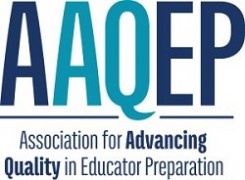Accreditation
 Sixteen of the academic programs at the College of Education at the University of Hawai‘i at Mānoa are nationally accredited by the Association for Advancing Quality in Educator Preparation (AAQEP) through June 30, 2028. In addition, our Master of Science in Professional Athletic Training is nationally accredited by the Commission on Accreditation of Athletic Training (CAATE) through the 2030-31 academic year. The College was nationally accredited from 2001 to 2018 by NCATE, the National Council for Accreditation of Teacher Education.
Sixteen of the academic programs at the College of Education at the University of Hawai‘i at Mānoa are nationally accredited by the Association for Advancing Quality in Educator Preparation (AAQEP) through June 30, 2028. In addition, our Master of Science in Professional Athletic Training is nationally accredited by the Commission on Accreditation of Athletic Training (CAATE) through the 2030-31 academic year. The College was nationally accredited from 2001 to 2018 by NCATE, the National Council for Accreditation of Teacher Education.
Accreditation means that the College of Education (COE) meets the highest national standards for the preparation of teachers, administrators, and other professionals. COE programs are aligned with performance standards established by HTSB, the Interstate New Teacher Assessment and Support Consortium (InTASC), and the National Board for Professional Teaching Standards (NBPTS).
In June 2021, sixteen of the College of Education’s (COE) academic programs were awarded full national 7-year accreditation (through June 30, 2028) by the Association for Advancing Quality in Educator Preparation (AAQEP). AAQEP was founded by educators in 2017 to promote the preparation of effective educators in innovative, outcome-focused programs that engage education’s toughest challenges directly and in context. AAQEP’s comprehensive standards for educator preparation specify aspects of completer performance and program practice that identify effective programs and that qualify those programs for AAQEP accreditation. After reviewing the evidence collected through a process of self-study and peer review, the AAQEP Accreditation Commission issued the full accreditation decision at its June 25, 2021 meeting for the COE’s initial teacher licensure programs and advanced-level graduate programs in education and educational psychology. Full accreditation acknowledges that a program prepares effective educators who continue to grow as professionals and has demonstrated the commitment and capacity to maintain quality.
In addition, our Master of Science in Professional Athletic Training is nationally accredited by the Commission on Accreditation of Athletic Training (CAATE) through the 2030-21 academic year.
The COE was first awarded national accreditation in 2001 by the National Council for the Accreditation of Teacher Education (NCATE), with continuing national accreditation decisions in 2007/2009 and 2014.
The College earned the Western Association of Schools and Colleges (WASC) approval for our new EdD in Professional Educational Practice in 2012. Our COE programs that are not nationally accredited undergo university-led program review on a cyclical basis to ensure these programs maintain academic quality and engage in continuous improvement.
In addition, the College submits annual reports to the following:
- Hawaii Teacher Standards Board
- US News and World Report Best Graduate Schools Survey
- Title II Higher Education Opportunity Act
The following College of Education academic programs are nationally accredited:
Education Preparation Annual Reporting Measures
The COE submits annual reports for our AAQEP accredited initial licensure and advanced programs. The most recent annual reports are available below:
- COE Annual Productivity Data Report
- Report includes student data on enrollment, program completion, and demographics
